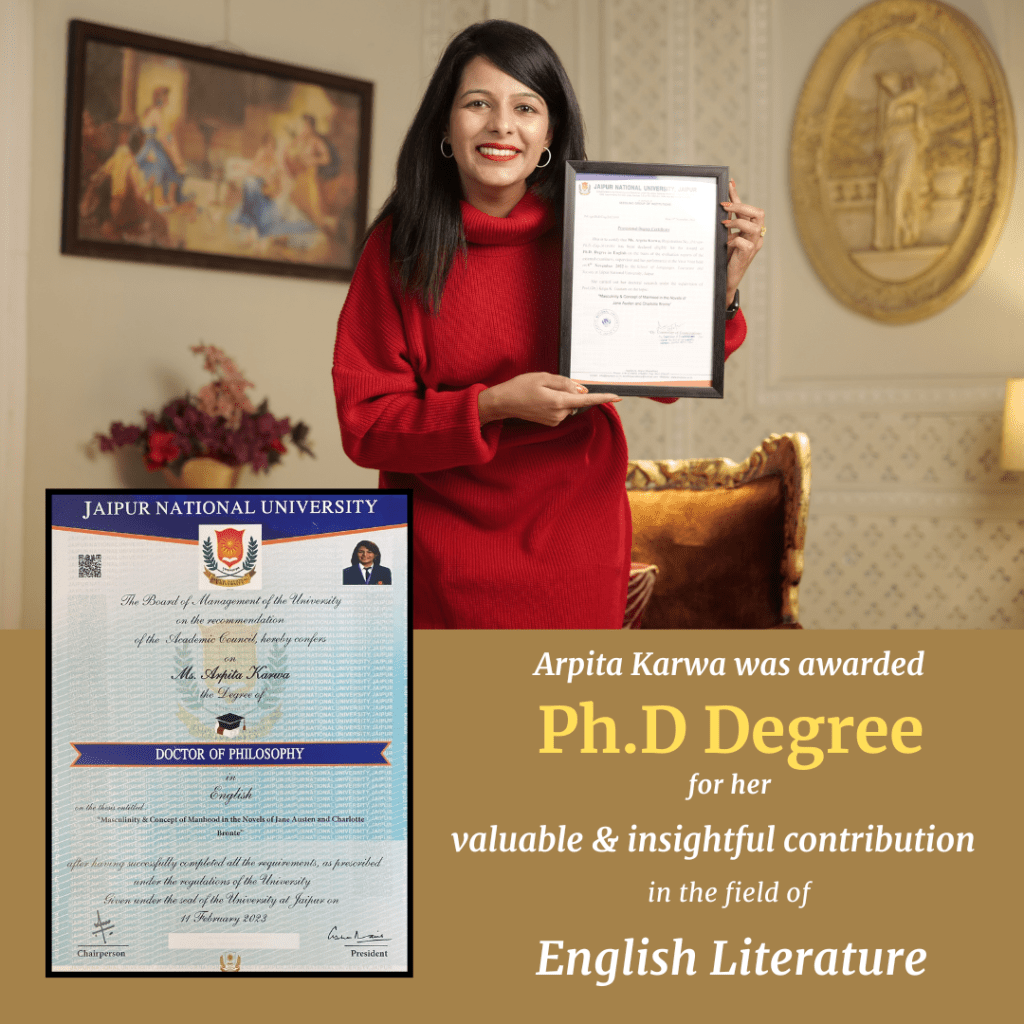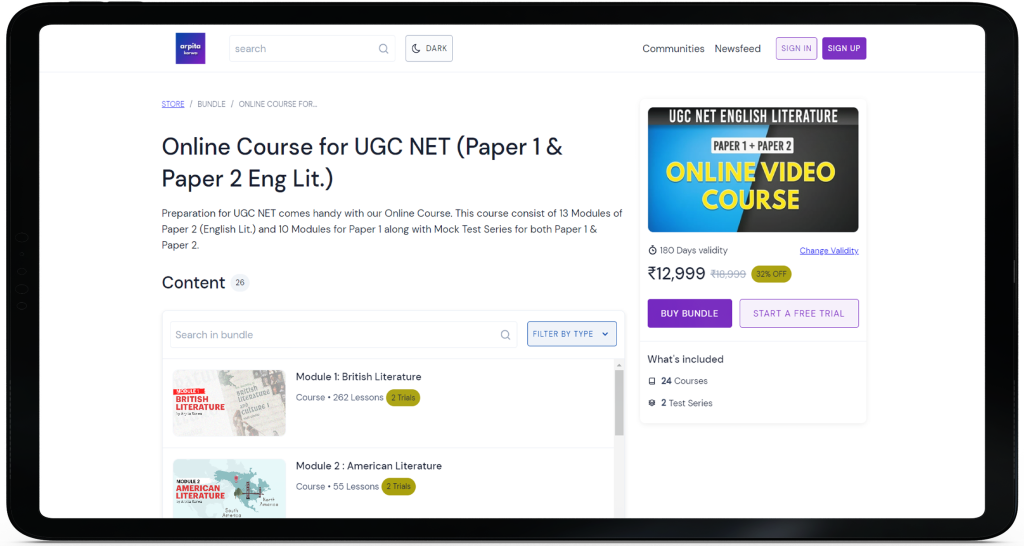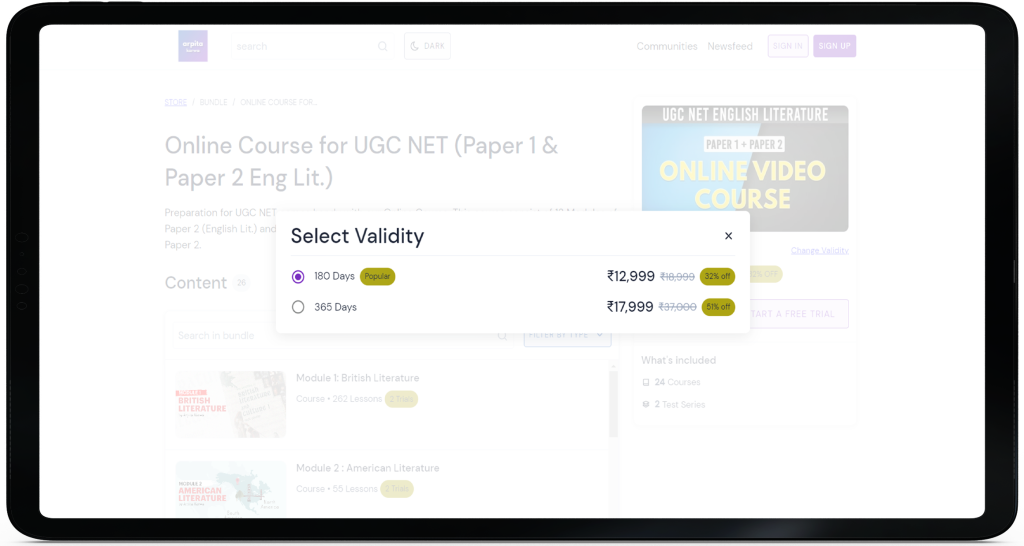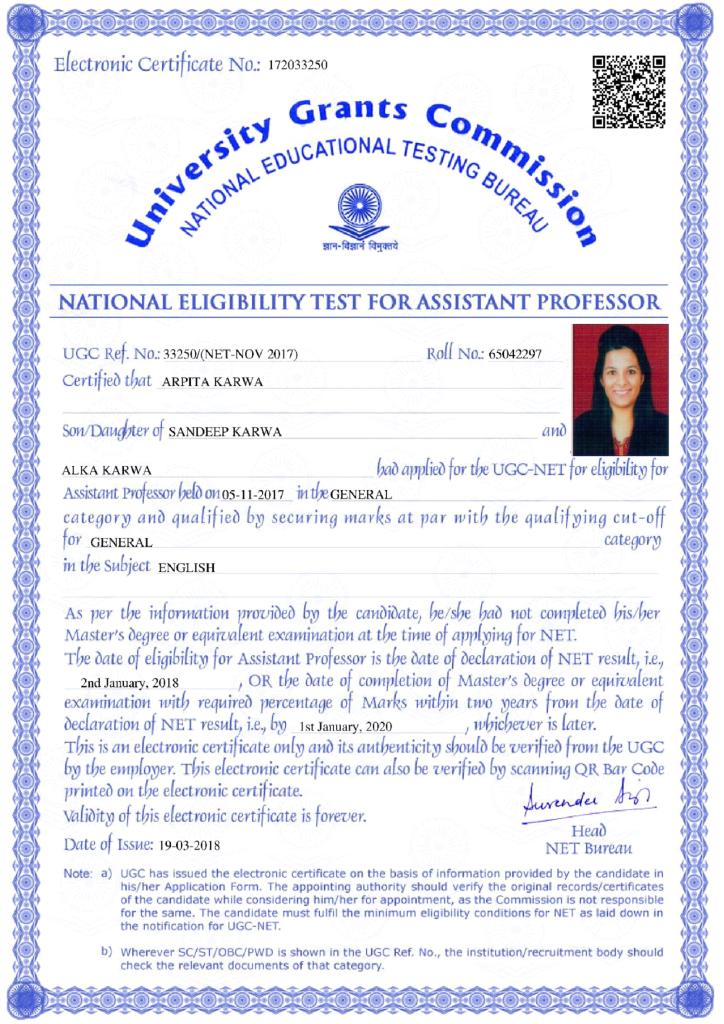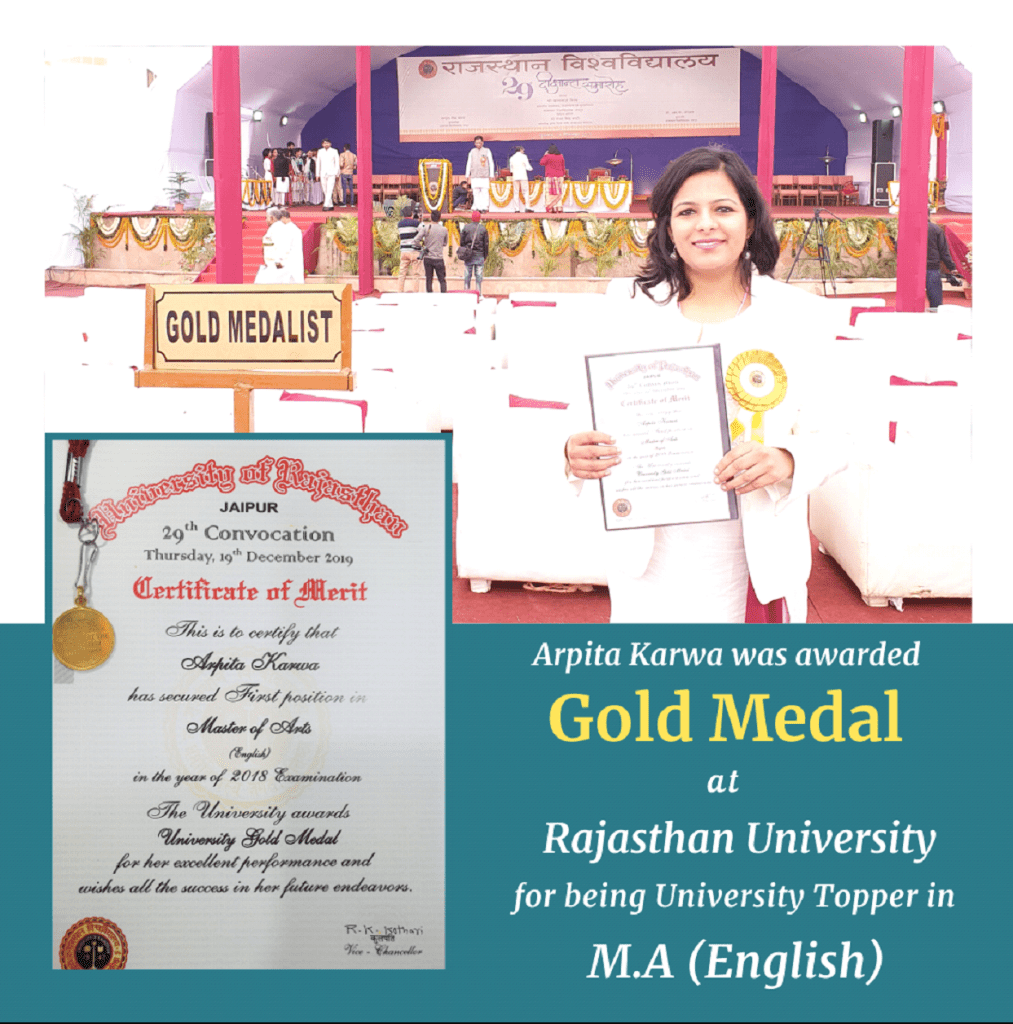JNU M.A. ENGLISH, ENTRANCE EXAM 2020
June 19, 2023 2023-12-11 18:23JNU M.A. ENGLISH, ENTRANCE EXAM 2020
JNU M.A. English, Entrance Exam 2020
JNU
M.A. ENGLISH ENTRANCE EXAM, 2020
Q.1) Who among the following are associated with ‘Russian formalism’?
(a) Roman Jakobson
(b) Leo Spitzer
(c) Emile Benveniste
(d) Viktor Shklovsky
Choose the correct answer from the options given below:
[1] (a) and (d) Only
[2] (a) and (c) Only
[3] (c) and (b) Only
[4] (b) and (d) Only
Answer: (a) and (d) Only
Q.2) Given below are two Statements:
Statement I: Psychoanalysis is based on Freud’s theories of how the mind, the instincts and sexuality work.
Statement Il: Literary texts, like dreams, express the secret unconscious desires and anxieties of the author.
In the light of the above statements, choose the most appropriate answer from the options given below:
[1] Both Statement I and Statement Il are correct
[2] Both Statement I and Statement Il are incorrect
[3] Statement I is correct but Statement Il is incorrect
[4] Statement I is incorrect but Statement Il is correct
Answer: Both Statement I and Statement Il are correct
Q.3) Which of the following terms best describes the silences and pauses in a Harold Pinter play?
[1] Supplement
[2] Subplot
[3] Subtext
[4] Subgenre
Answer: Subtext
Q.4) Arrange the following western critical and theoretical works in their chronological order:
(A) On the Art of Poetry
(B) The Common Reader
(C) Theaetetus
(D) What is a Classic?
Choose the correct answer from the options given below:
[1] (B), (D), (C), (A)
[2] (C), (A), (B), (D)
[3] (D), (B), (A), (C)
[4] (A), (C), (D), (B)
Answer: (C), (A), (B), (D)
Q.5) Match List-I with List-Il.
List-I
(Novels)
(a) Darkness at Noon
(b) And Quiet Flows the Don
(c) The Tin Drum
(d) Waiting for the Barb arians
List-Il
(Writers)
(i) Mikhail Sholokhov
(ii) J.M. Coetzee
(iii) Arthur Koestler
(iv) Gunter Grass
Choose the correct answer from the options given below:
[1] A-ii, B-iii, C-i, D-iv
[2] A-iv, B-ii, C-iii, D-i
[3] A-iii, B-i, C-iv, D-ii
[4] A-i, B-iv, C-ii, D-iii
Answer: A-iii, B-i, C-iv, D-ii
Q.6) T.S. Eliot’s “The Love Song of J. Alfred Prufrock” falls into the category of:
[1] limerick
[2] dramatic monologue
[3] villanelle
[4] nonsense verge
Answer: dramatic monologue
Directions (Q. 7 to 9): Read the following poem and answer the questions that follow:
Untitled
Rainer Maria Rilke
Do you still remember: falling stars, how they slantwise through the sky
like horses over suddenly held-out hurdles of our wishes – did we have so many? –
for stars, innumerable, leapt everywhere; almost every gaze upward became
wedded to the swift hazard of their play, and our heart felt like a single thing beneath the vast disintegration of their brilliance – and was whole, as if it would survive them.
Q.7) In the poem ‘falling stars’ are compared to:
(a) swift gazes
(b) vast integration
(c) thwarted wishes
(d) leaping horses
Choose the correct answer from the options given below:
[1] (a) and (d) Only
[2] (a) and (c) Only
[3] (b) and (c) Only
[4] (c) and (d) Only
Answer: (c) and (d) Only
Q.8) The expression, ‘did we have so many’, suggests:
[1] we had quite a few
[2] we had precious little
[3] we couldn’t have so many
[4] we were surprised by many
Answer: we had quite a few
Q.9) Whose play is referred to in line 7?
[1] Hearts’
[2] Stars’
[3] Skies’
[4] Gazes’
Answer: Stars’
Q.10) Arrange the following playwrights in the chronological order of their birth:
(A) Samuel Beckett
(B) Henrik Ibsen
(C) Luigi Pirandello
(D) August Strindberg
Choose the correct answer from the options given below:
[1] (D), (B), (A), (C)
[2] (A), (C), (D), (B)
[3] (C), (A), (B), (D)
[4] (B), (D), (C), (A)
Answer: (B), (D), (C), (A)
Q.11) Arrange the following paintings in the chronological order of their creation:
(a) The Persistence of Memory by Salvador Dali
(b) The Creation of Adam by Michelangelo
(c) The Scream by Edvard Munch
(d) The Night Watch by Rembrandt
Choose the correct answer from the options given below:
[1] (C), (A), (B), (D)
[2] (D), (B), (A), (C)
[3] (A), (C), (D), (B)
[4] (B), (D), (C), (A)
Answer: (B), (D), (C), (A)
Q.12) Which of the following are examples of sonnet cycles?
(a) Philip Sidney, Astrophil and Stella
(b) William Blake, The Marriage of Heaven and Hell
(c) Edmund Spenser, Amoretti
(d) Mary Coleridge, Gathered Leaves
e) Dante Gabriel Rossetti, The House of Life
Choose the correct answer from the options given below:
[1] (a), (b) and (c) Only
[2] (a), (c) and (e) Only
[3] (b), (d) and (e) Only
[4] (b), (c) and (d) Only
Answer: (a), (c) and (e) Only
Q.13) Who among the following made a distinction between ‘panoramic’ vision and ‘scenic’ vision?
[1] Percy Lubbock
[2] Norman Friedman
[3] Wayne Booth
[4] Gerard Genette
Answer: Percy Lubbock
Q.14) Which of the following are books by Khaled Hosseini?
(a) And the Mountains Echoed
(b) Dear Zari
(c) A Thousand Splendid Suns
(d) Difficult Daughters
Choose the correct answer from the options given below:
[1] (a) and (d) Only
[2] (b) and (c) Only
[3] (a) and (c) Only
[4] (c) and (d) Only
Answer: (a) and (c) Only
Directions (Q. 15 to 17): Read the following passage and answer the questions that follow:
I have always maintained that the writer’s task has nothing to do with mystery or magic, and that the poet’s, at least, must be a personal effort for the benefit of all. The closest thing to poetry is a loaf of bread or a ceramic dish or a piece of wood lovingly carved, even if by clumsy hands. And yet I don’t believe any craftsman except the poet, still shaken by the confusion of his dreams, ever experiences the ecstasy produced only once in his life, by the first object his hands have created. It’s a moment that will never come back. There will be many editions, more elaborate, more beautiful. His words will be poured into the glasses of other languages like a wine, to sing and spread its aroma to other places on this earth. But that moment when the first book appears with its ink fresh and its paper still crisp, that enchanted and ecstatic moment, with the sound of wings beating or the first flower opening on the conquered height, that moment comes only once in the poet’s life time.
-Pablo Neruda, Memoirs, trans. Hardie St. Martin
Q.15) According to Neruda what is the singular moment in al poet’s life?
[1] when his first poem is conceived
[2] when his first poem is executed
[3] when his first collection is crafted
[4] when his first collection is planned
Answer: when his first collection is crafted
Q.16) By saying that “[t]he closest thing to poetry is a loaf of bread or a ceramic dish or a piece of wood lovingly carved…”, Neruda implies that poetry:
[1] is a creative effort like any other.
[2] is not another creative effort.
[3] is just another impersonal effort.
[4] is just an act that happens.
Answer: is a creative effort like any other
Q.17) Contextually the words, “spread its aroma”, suggest that poetry has the potential to:
[1] enchant.
[2] support.
[3] amplify.
[4] travel.
Answer: travel
Q.18) Which of the following Shakespearean plays constitutes the source of the title in Robert Browning’s
“Childe Harold to the Dark Tower Came”?
[1] Othello
[2] The Tempest
[3] King Lear
[4] The Winter’s Tale
Answer: King Lear
Q.19) Which of the following statements are true of ‘post- structuralism’?
(a) It questions the linking of structuralism to Saussurean linguistics.
(b) It complements structuralism by offering alternative modes of inquiry, explanation and interpretation.
(c) It tends to affirm that a stable textual meaning is identifiable.
(d) It is allied to a belief in the incommensurable qualities of language.
Choose the correct answer from the options given below:
[1] (a) and (b) Only
[2] (b) and (d) Only
[3] (c) and (d) Only
[4] (b) and (c) Only
Answer: (b) and (d) Only
Q.20) Which two of the following short stories are written by Alice Munro?
a) “Dancing Girls”
(b) “The Grave of the Famous Poet”
c) “Boys and Girls”
(d) “The Bear Came Over the Mountain”
Choose the correct answer from the options given below:
[1] (a) and (b) Only
[2] (a) and (d) Only)
[3] (b) and (c) Only
[4] (c) and (d) Only
Answer: (c) and (d) Only
Q.21) Which of the following novels begins with the description of a wrestling match between its protagonist and Amalinze, the Cat ?
[1] Things Fall Apart by Chinua Achebe
[2] Petals of Blood by Ngugi wa’ Thiongo
[3] A Thousand Seasons by Ayi Kwei Armah
[4] This Earth, My Brother by Kofi Awoonor
Answer: Things Fall Apart by Chinua Achebe
Q.22) Arrange the following events in the right sequence in which they occur in Shakespeare’s The Merchant of Venice:
(a) Jessica and Lorenzo elope
b) Shylock turns down Bassanio’s invitation to dinner
(c) Launcelot joins Bassanio’s service.
(d) Bassanio goes to Belmont as a pilgrim.
(e) Nerissa and Gratiano marry
Choose the correct answer from the options given below:
[1] (c), (b), (d), (e), (a)
[2] (b), (d), (a), (e), (c)
[3] (d), (b), (c), (a), (e)
[4] (a), (b), (c), (d), (e)
Answer: (d), (b), (c), (a), (e)
Q.23) Which two of the following are forms of comic verse?
a) limerick
b) eclogue
c) clerihew
d) aubade
Choose the correct answer from the options given below
[1] (a) and (d) Only
[2] (a) and (c) Only
[3] (c) and (d) Only
[4] (b) and (d) Only
Answer: (a) and (c) Only
Q.24) Match List-I with List-II.
List-I
(Phrases)
(a) ‘still unravished bride of quietness’
(b) ‘a dome of many- coloured glass”
(c) the bliss of solitude”
(d) ‘fearful symmetry”
List-II
(Poets)
i) Blake
ii) Keats
iii) Shelley
iv) Wordsworth
Choose the correct answer from the options given below:
[1] A-ii, B-iii, C-iv, D-i
[2] A-iii, B-i, C-ii, D-iv
[3] A-iv, B-iii, C-i, D-ii
[4] A-ii, B-iv, C-iii, D-i
Answer: A-ii, B-iii, C-iv, D-i
Q.25) Who are the German scholars well-versed in the practice of magic who teach Faustus the art of conjuring?
[1] Rosencrantz and Guildenstern
[2] Robin and Wagner.
[3] Valdes and Cornelius.
[4] Wasserkopf and Rudolf
Answer: Valdes and Cornelius
Q.26) Who among the following propounded “the doctrine of endurance” during Jane Eyre’s stay at the Lowood boarding school?
[1] Miss Scatcherd
[2] Helen Burns
[3] Mary Ann Wilson
[4] Miss Temple
Answer: Helen Burns
Q.27) The poet Allen Ginsberg and the novelist Jack Kerouac belonged to a group/movement called:
[1] The Harlem Renaissance
[2] The Southern Agrarians
[3] The Beat Generation
[4] The Lost Generation
Answer: The Beat Generation
Q.28) Who among the following said that a sonnet is “a moment’s monument”?
[1] Ezra Pound
[2] Emily Dickinson
[3] Matthew Arnold
[4] Dante Gabriel Rossetti
Answer: Dante Gabriel Rossetti
Q.29) Which two of the following works are written by Frantz Fanon?
(a) The Wretched of the Earth
(b) Culture and Imperialism
(c) Decolonising the Mind
(d) Black Skin, White Masks
Choose the correct answer from the options given below:
[1] (a) and (c) Only
[2] (a) and (d) Only
[3] (b) and (c) Only
[4] (b) and (d) Only
Answer: (a) and (d) Only
Q.30) What was the original working title that Virginia Woolf used for Mrs Dalloway?
[1] The Flowers
[2] The Streets
[3] The Hours
[4] The Virgins
Answer: The Hours
Q.31) Which two of the following are titles of collections of poems by Kamala Das?
(a) Summer in Calcutta
(b) The Striders
(c) A Rain of Rites
(d) The Old Playhouse, and Other Poems
Choose the correct answer from the options given below:
[1] (a) and (d) Only
[2] (a) and (c) Only
[3] (c) and (d) Only
[4] (b) and (d) Only
Answer: (a) and (d) Only
Q.32) Which of the following works by Derek Walcott is a reworking of the Iliad?
[1] Another Life
[2] Sea Grapes
[3] The Star-Apple Kingdom
[4] Omeros
Answer: Omeros
Q.33) Who among the following first put forward the term, ‘superdiversity’?
[1] Peter Trudgill
[2] David Crystal
[3] Steven Vertovec
[4] Mario Saraceni
Answer: Steven Vertovec
Directions (Q.34 to 36): Read the following poem and answer the questions that follow:
To A Winter Squirrel – Gwendolyn Brooks That is the way God made you.
And what is wrong with it? Why, nothing. Except that you are cold and cannot cook.
Merdice can cook. Merdice Of murdered heart and docked sarcastic soul.
Merdice The bolted nomad, on a winter noon cooks guts; and sits in gas. (She has no shawl; her landlord has no coal.)
You out beyond the shellac of her look and of her sill! She envies you your furry buffoonery
that enfolds your silver skill. She thinks you are a mountain and a star, unbaffleable; with sentient twitch and scurry.
Q.34) Who among the following comes out as quite deprived?
[1] God
[2] the squirrel
[3] Merdice
[4] the landlord
Answer: Merdice
Q.35) Which two of the following statements are correct?
(a) Merdice is a cook of the landlord.
(b) Merdice envies the squirrel’s behaviour.
(c) Merdice is happy to have food to eat.
(d) Merdice had been betrayed in love.
Choose the correct answer from the options given below:
[1] (a) and (b) Only
[2] (b) and (c) Only
[3] (a) and (d) Only
[4] (c) and (d) Only
Answer: (b) and (c) Only
Q.36) The phrase, “sentient twitch” in the concluding line is related to:
[1] envy
[2] skill
[3] winter
[4] movement
Answer: movement
Q.37) Which two among the following are works by Michel Foucault?
(a) The Birth of the Clinic
(b) The Care of the Self
(c) The Gift of Death
(d) Writing and Difference
Choose the correct answer from the options given below:
[1] (a) and (d) Only
[2] (b) and (c) Only
[3] (a) and (b) Only
[4] (b) and (d) Only
Answer: (a) and (b) Only
Q.38) Who is of the view that all texts are “translations of translation of translations”?
[1] Eugene Nida
[2] Andre Lefevere
[3] Octavio Paz
[4] Walter Benjamin
Answer: Octavio Paz
Q.39) Which two poems in the following list are by Derek Walcott?
(a) “The Star-Apple Kingdom”
(b) “Goats and Monkeys”
(c) “Rough Sketch Beginning”
(d) “Signals from the Simple Life”
Choose the correct answer from the options given below:
[1] (a) and (b) Only
[2] (b) and (c) Only
[3] (a) and (d) Only
[4] (b) and (d) Only
Answer: (a) and (b) Only
Q.40) Lucy Snowe is a character in:
[1] Adam Bede
[2] Villette
[3] Jude the Obscure
[4] North and South
Answer: Villette
Q.41) Which of the following novels by James Joyce appeared first as extracts entitled ‘Work in Progress”?
[1] Ulysses
[2] Finnegans Wake
[3] A Portrait of the Artist as a Young Man
[4] Stephen Hero
Answer: Finnegans Wake
Q.42) The most important element of a tragedy, in Aristotle’s view, is:
[1] plot.
[2] spectacle
[3] propriety.
[4] character.
Answer: plot
Q.43) Given below are two Statements:
Statement I: A pun is a play on words, depending on similarity of sound and difference in meaning.
Statement II: Shakespeare was prudent enough not to employ punning in serious contexts.
In the light of the above statements, choose the most appropriate answer from the options given below:
[1] Both Statement I and Statement II are true.
[2] Both Statement I and Statement II are false.
[3] Statement I is true but Statement II is false.
[4] Statement I is false but Statement II is true.
Answer: Statement I is true but Statement II is false
Q.44) Who was the first to create the ‘portmanteau word’?
[1] Oscar Wilde
[2] Thomas Carlyle
[3] Rudyard Kipling
[4] Lewis Carroll
Answer: Lewis Carroll
Q.45) Who among the following is associated with the ‘allegory of the cave’?
[1] Plato
[2] Aristotle
[3] Socrates
[4] Longinus
Answer: Plato
Q.46) Which of the following corresponds to the definition of ‘literariness’ offered by Russian Formalism?
[1] features of a language text that reinforces the universal traits of literature
[2] stress on the literary aspects of the language of everyday use
[3] use of language that invests common speech with aesthetic properties
[4] the sum of devices that distinguish literary language from ordinary language
Answer: the sum of devices that distinguish literary language from ordinary language
Q.47) Who developed the concept of hegemony as a tool for cultural analysis?
[1] Viktor Shklovsky
[2] Raymond Williams
[3] Theodor Adorno
[4] Antonio Gramsci
Answer: Antonio Gramsci
Q.48) Which of the following novels by Charles Dickens chronicles the efforts to convert a child into a thief?
[1] Great Expectations
[2] David Copperfield
[3] Nicholas Nickleby
[4] Oliver Twist
Answer: Oliver Twist
Q.49) Who is the author of the novel, July’s People portraying a black revolt against the apartheid regime?
[1] Andre Brink
[2] J. M. Coetzee
[3] Nadine Gordimer
[4] Breyten Breytenbach
Answer: Nadine Gordimer
Q.50) Match List-I with List-II.
List-I
(Novelists)
(a) Elizabeth Gaskell
(b) Robert Tressell
(c) George Gissing
(d) Charles Kingsley
List-II
(Novels)
(i) The Ragged-Trousered Philanthropists
(ii) The Nether World
(iii) Alton Locke
(iv) Mary Barton
Choose the correct answer from the options given below:
[1] A-ii, B-iii, C-iv, D-i
[2] A-iii, B-iv, C-ii, D-i
[3] A-ii, B-iii, C-i, D-iv
[4] A-iv, B-i, C-ii, D-iii
Answer: A-iv, B-i, C-ii, D-iii
Q.51) Rejecting the interpretation of catharsis as purgation, who among the following made the curious remark that the theatre is not a hospital”?
[1] Arthur Miller
[2] F. L. Lucas
[3] Gilbert Murray
[4] J. W. H. Atkins
Answer: F. L. Lucas
Q.52) Which poem by Philip Larkin refers to Lady Chatterley’s Lover and the Beatles?
[1] “High Windows”
[2] “This Be the Verse”
[3] “To the Sea”
[4] “Annus Mirabilis”
Answer: “Annus Mirabilis”
Q.53) Vikram Seth’s An Equal Music is a love story between:
(a) a violinist
(b) a pianist
(c) a cellist
(d) a clarinettist
Choose the correct answer from the options given below:
[1] (a) and (d) Only
[2] (a) and (b) Only
[3] (c) and (d) Only
[4] (b) and (d) Only
Answer: (a) and (b) Only
Q.54) What is achieved when the audience is made aware of a disparity between the facts of a situation and the characters’ understanding of it?
[1] aesthetic distance
[2] dramatic irony
[3] pathetic fallacy
[4] comic relief
Answer:dramatic irony
Q.55) Who is the author of the essay “On the Abolition of the English Department”?
[1] Ngugi wa Thiong’o
[2] Frantz Fanon
[3] Chinua Achebe
[4] Aime Cesaire
Answer: Ngugi wa Thiong’o
Q.56) Darkness in Joseph Conrad’s Heart of Darkness is located at the heart of civilized Europe and highlights the:
[1] monstrous and exploitative nature of imperialism.
[2] civilizing mission of imperialism.
[3] universal and ontological nature of imperialism.
[4] the idea of progress originating in the Enlighten- ment.
Answer: monstrous and exploitative nature of imperialism
Q. 57) Match List-I with List-II.
List-I
(Books)
(a) Mistress of Spices
(b) The Dark Holds
(c) Idris: Keeper of the Light
(d) The Namesake
List-II
(Writers)
(i) Anita Nair
(ii) Chitra Banerjee Kivakaruni
(iii) Jhumpa Lahiri
(iv) Sashi Deshpande
Choose the correct answer from the options given below:
[1] A-iii, B-i, C-ii, D-iv
[2] A-i, B-iii, C-iv, D-ii
[3] A-iv, B-ii, C-iii, D-i
[4] A-ii, B-iv, C-i, D-iii
Answer: A-ii, B-iv, C-i, D-iii
Q.58) Arrange the following works of Thomas Hardy in the chronological order of their publication:
(a) The Return of the Native
(b) Tess of the d’Urbervilles
(c) The Mayor of Casterbridge
(d) Far from the Madding Crowd
Choose the correct answer from the options given below:
[1] (b), (d), (c), (a)
[2] (d), (a), (c), (b)
[3] (b), (d), (a), (c)
[4] (a), (d), (c), (b)
Answer: (d), (a), (c), (b)
Q.59) Which of the following statements are true?
(a) English is not included in the Eighth Schedule of the Constitution as a language of India.
(b) The number of people in India who use English as their native language is smaller than that of those who use English as their second language.
(c) The States in India are free to choose their official language and to use English as the medium of inter-state communication.
(d) The number of people who communicate in English is growing because English is the native language of a small minority.
(e) English has been designated an official language in India, supplanting Hindi as the language used for government activities.
Choose the correct answer from the options given below:
[1] (a), (b) and (c) Only
[2] (b), (c) and (d) Only
[3] (c), (d) and (e) Only
[4] (b), (c) and (e) Only
Answer: (a), (b) and (c) Only
Directions (Q. 60 to 62): Read the following poem and answer the questions that follow:
Introduction to Poetry -BILLY COLLINS
I ask them to take a poem and hold it up to the light like a color slide or press an ear against its hive.
I say drop a mouse into a poem and watch him probe his way out, or walk inside the poem’s room and feel the walls for a light switch.
I want them to waterski across the surface of a poem waving at the author’s name on the shore.
But all they want to do is tie the poem to a chair with rope and torture a confession out of it.
They begin beating it with a hose to find out what it really means.
Q.60) Who among the following is best represented by the words ‘them’, ‘they’ in this poem?
[1] Poets
[2] Editors
[3] Publishers
[4] Critics
Answer: Critics
Q.61) In the light of what precedes it what does the word ‘rope’ imply?
[1] a constraint
[2] a lens
[3] a link
[4] a support
Answer: a constraint
Q.62) The last two lines suggest a:
[1] failure to understand poetry.
[2] stubborn hunt for a meaning.
[3] delayed response to poetry.
[4] rejection of poetic license.
Answer: stubborn hunt for a meaning
Q.63) Match List-I with List-II.
List-I
(Playwrights)
(a) William Wycherley
(b) John Vanbrugh
(c) George Etherege
(d) William Congreve
List-II
(Plays)
(i) The Way of the World
(ii) The Country Wife
(iii) The Provoked Wife
(iv) The Man of Mode
Choose the correct answer from the options given below:
[1] A-ii, B-iv, C-iii, D-i
[2] A-iii, B-iv, C-ii, D-i
[3] A-ii, B-iii, C-iv, D-i
[4] A-ii, B-iv, C-i, D-iii
Answer: A-ii, B-iii, C-iv, D-i
Q.64) Given below are two Statements:
Statement I: Colonialism was an identical process in different parts of the world.
Statement II: Colonialism, everywhere, locked the original inhabitants and the settlers into complex and traumatic relationships.
In the light of the above statements, choose the most appropriate answer from the options given below:
[1] Both Statement I and Statement II are true
[2] Both Statement I and Statement II are false
[3] Statement I is true but Statement II is false
[4] Statement I is false but Statement II is true
Answer: Statement I is false but Statement II is true
Q.65) The principle of poetic justice stipulates that:
[1] justice should be meted out in poetic terms.
[2] poetry ensures justice in more equitable terms.
[3] the virtuous should be rewarded and the vicious punished.
[4] human nature can be reformed through poetic practice.
Answer: the virtuous should be rewarded and the vicious punished
Q.66) Who is the author of American Renaissance?
[1] F.O. Matthiessen
[2] Edmund Wilson
[3] V.L. Parrington
[4] V.F. Calverton
Answer: F.O. Matthiessen
Directions (Q. 67 to 69): Read the following extract and answer the questions that follow:
The winter evening settles down
With smell of steaks in passageways.
Six o’clock.
The burnt-out ends of smoky days.
– T. S. Eliot, “The Preludes”
Q.67) Which type of imagery is used in the second line?
[1] Visual
[2] Olfactory
[3] Gustatory
[4] Auditory
Answer: Olfactory
Q.68) Which of the following best describes the tone of the third line?
[1] grim
[2] emotional
[3] visionary
[4] matter-of-fact
Answer: matter-of-fact
Q.69) The last line conveys a sense of:
[1] exhaustion.
[2] closure.
[3] expectation.
[4] progression.
Answer: exhaustion
Q.70) Who wrote the Preface to Frantz Fanon’s The Wretched of the Earth?
[1] Jean-Paul Sartre
[2] Maurice Merleau-Ponty
[3] Albert Camus
[4] Hannah Arendt
Answer: Jean-Paul Sartre
Q.71) Who among the following are the compilers of Hobson- Jobson: The Definitive Glossary of British India (1886)?
(a) J. Drew Gay
(b) William Caine
(c) Henry Yule
(d) Arthur Burnell
Choose the correct answer from the options given below:
[1] (a) and (d) Only
[2] (a) and (c) Only
[3] (c) and (d) Only
[4] (b) and (d) Only
Answer: (c) and (d) Only
Directions (Q.72 to 74): Read the following passage and answer the questions that follow:
Goodness is easier to recognize than to define; only the greatest novelists can portray good people. For me, the least unsatisfactory description is to say that any thing or creature is good which is discharging its proper function, using its power to the fullest extent permitted by its environment and its own nature though we must remember that “nature” and “environment” are intellectual abstractions from a single, constantly changing reality. Thus, people are happy and good who have found their vocation: what vocations are there are will depend upon the society within which they are practised.
-W.H. Auden, “My Belief”
Q.72) Which of the following is suggested in the passage?
Goodness is:
[1] better explained than experienced.
[2] better experienced than explained.
[3] better experienced by the great novelists.
[4] better explained by the keen intellects.
Answer: better experienced than explained
Q.73) Which two of the following statements will aptly describe good people?
People who are good:
(a) are also happy.
(b) are also powerful.
(c) are able to discharge any function.
(d) are doing work that suits them.
Choose the correct answer from the options given below:
[1] (a) and (d) Only
[2] (a) and (c) Only
[3] (c) and (d) Only
[4] (b) and (d) Only
Answer: (a) and (d) Only
Q.74) The determining context for people to be good is:
[1] function
[2] power
[3] nature
[4] occupation
Answer: occupation
Q.75) Who coined the term, ‘arrivant’?
[1] Edward Kamau Brathwaite
[2] Derek Walcott
[3] C. L. R. James
[4] George Lamming
Answer: Edward Kamau Brathwaite
Q.76) Match List-I with List-II.
List-I
(Detectives in Fiction
)(a) Father Brown
(b) Auguste Dupin
(c) Hercule Poirot
(d) Peter Wimsey
List-II
(Creators)
(i) Agatha Christie
(ii) Dorothy L. Sayers
(iii) G.K. Chesterton
(iv) Edgar Allan Poe
Choose the correct answer from the options given below:
[1] A-ii, B-i, C-iii, D-iv
[2] A-iv, B-ii, C-i, D-iii
[3] A-i, B-iii, C-ii, D-iv
[4] A-iii, B-iv, C-i, D-ii
Answer: A-iii, B-iv, C-i, D-ii
Q.77) Who collaborated with Malcolm X in the publication of The Autobiography of Malcolm X?
[1] August Wilson
[2] Maya Angelou
[3] Alex Haley
[4] Amiri Baraka
Answer: Alex Haley
Q.78) Match List-I with List-II.
List-I
(Books)
(a) Gai-Jin
(b) The Kite Runner
(c) My Name is Red
(d) Kafka on the Shore
List-II
(Writers)
(i) Khaled Hosseini
(ii) Haruki Murakami
(iii) James Clavell
(iv) Orhan Pamuk
Choose the correct answer from the options given below:
[1] A-iii, B-i, C-iv, D-ii
[2] A-ii, B-iii, C-i, D-iv
[3] A-i, B-iv, C-ii, D-iii
[4] A-iv, B-ii, C-iii, D-i
Answer: A-iii, B-i, C-iv, D-ii
Q.79) Which two of the following pairs are to the work of Ferdinand de Saussure?
(a) signifier/signified
(b) sjuzet/fabula
(c) langue/parole
(d) icon/index
Choose the correct answer from the options given below:
[1] (a) and (d) Only
[2] (b) and (d) Only
[3] (c) and (d) Only
[4] (a) and (c) Only
Answer: (a) and (c) Only
Q.80) Which of the following refers to a manuscript in which a later writing is superimposed on an effaced earlier writing?
[1] Palindrome
[2] Palinode
[3] Palimpsest
[4] Palladian
Answer: Palimpsest
Q.81) Which of the following plays opens with an Induction scene in which the drunken Christopher Sly is persuaded to believe that he is a lord out of his mind?
[1] The Taming of the Shrew
[2] The Comedy of Errors
[3] Much Ado About Nothing
[4] A Midsummer Night’s Dream
Answer: The Taming of the Shrew
Q.82) Who is the author of Locana?
[1] Udbhata
[2] Bhamaha
[3] Abhinavagupta
[4] Rajasekhara
Answer: Abhinavagupta
Q.83) Match List-I with List-II.
List-I
(Authors)
(a) Michel Foucault
(b) Jean-Francois Lyotard
(c) Roland Barthes
(d) Jacques Lacan
List-II
(Theoretical Terms)
(i) ‘grand narrative’
(ii) ‘mirror stage’
(iii) ‘governmentality’
(iv) ‘death of the author’
[1]A-ii, B-iii, C-i, D-iv
[2] A-i, B-iv, C-ii, D-iii
[3] A-iv, B-ii, C-iii, D-i
[4] A-iii, B-i, C-iv, D-ii
Answer: A-iii, B-i, C-iv, D-ii
Q.84) Which of the following plays are grouped together as the Wesker Trilogy?
(a) The Kitchen
(b) I’m Talking about Jerusalem
(c) Roots
(d) Chicken Soup with Barley
(e) Chips with Everything
Choose the correct answer from the options given below:
[1] (a), (b) and (c) Only
[2] (b), (c) and (d) Only
[3] (c), (d) and (e) Only
[4] (a), (d) and (e) Only
Answer: (b), (c) and (d) Only
Q.85) Match List-I with List-II.
List-I
(Author)
(a) Peter Handke
(b) Mario Vargas Llosa
(c) Nadine Gordimer
(d) Jose Saramago
List-II
(Country of Origin)
(i) Peru
(ii) Austria
(iii) Portugal
(iv) South Africa
Choose the correct answer from the options given below:
[1] A-ii, B-iii, C-iv, D-i
[2] A-iii, B-iv, C-i, D-ii
[3] A-ii, B-i, C-iv, D-iii
[4] A-i, B-iv, C-ii, D-iii
Answer: A-ii, B-i, C-iv, D-iii
Q.86) In which of the following works a parallel between a card game and the battle of the sexes is developed?
[1] A Tale of a Tub
[2] Pamela
[3] Joseph Andrews
[4] The Rape of the Lock
Answer: The Rape of the Lock
Q.87) In his Preface to Shakespeare, Samuel Johnson observes that Shakespeare:
(a) uses every opportunity in his plot to instruct or delight.
(b) is scrupulous in giving each age or nation its own customs, institutions and opinions.
(c) is seldom successful when he engages his characters in contests of sarcasm.
(d) has no heroes; his scenes are occupied only by men.
Choose the correct answer from the options given below:
[1] (a) and (c) Only
[2] (b) and (d) Only
[3] (c) and (d) Only
[4] (d) and (a) Only
Answer: (c) and (d) Only
Q.88) Who among the following wrote The Book of Laughter and Forgetting?
[1] Octavio Paz
[2] Philip Roth
[3] Filip Springer
[4] Milan Kundera
Answer: Milan Kundera
Q.89) Which of the following are characters in the fiction of Salman Rushdie?
(a) Moraes Zogoiby
(b) Helga Gerda Caro
(c) Saleem Sinai
(d) Agastya Sen
(e) Vina Apsara
Choose the correct answer from the options given below:
[1] (a), (c) and (e) Only
[2] (b), (c) and (d) Only
[3] (c), (d) and (e) Only
[4] (a), (b) and (c) Only
Answer: (a), (c) and (e) Only
Q.90) Which of the following novels by Rudyard Kipling features the journey of an orphan boy and a Tibetan Lama on the Grand Trunk Road?
[1] The Naulahka
[2] Kim
[3] The Jungle Book
[4] The Second Jungle Book
Answer: Kim
Q.91) Which two books among the following are by Umberto Eco?
(a) The Role of the Reader
(b) The Inhuman
(c) The Social Production of Art
(d) The Name of the Rose
Choose the correct answer from the options given below:
[1] (a) and (d) Only
[2] (a) and (c) Only
[3] (c) and (d) Only
[4] (b) and (d) Only
Answer: (a) and (d) Only
Directions (Q.92 to 95): Read the following extract and answer the questions that follow:
All the world’s a stage, And all the men and women merely players;
They have their exits and their entrances; And one man in his time plays many parts,
His acts being seven ages. At first the infant, Mewling and puking in the nurse’s arms;
And then the whining school-boy, with his satchel And shining morning face, creeping like snail Unwillingly to school. And then the lover, Sighing like furnace, with a woeful ballad Jealous in honour, sudden and quick in quarrel, Made to his mistress’ eyebrow.
Then a soldier, Full of strange oaths, and bearded like the pard,
Seeking the bubble reputation Even in the cannon’s mouth.
-William Shakespeare, As You Like It
Q.92) Which figure of speech is used in the opening line of the passage?
[1] Simile
[2] Metaphor
[3] Synecdoche
[4] Hyperbole
Answer: Metaphor
Q.93) What is the meaning of the word ‘[m]ewling”?
[1] yawning
[2] burping
[3] whimpering
[4] overeating
Answer: whimpering
Q.94) Why is reputation compared to ‘the bubble”?
Because it is:
[1] substantial.
[2] transparent
[3] ephemeral.
[4] intricate.
Answer: ephemeral
Q.95) Which of the following words best explains the behaviour of a soldier who is ‘sudden and quick”?
[1] aggressive
[2] violent
[3] desperate
[4] reckless
Answer: reckless
Q.96) Which two of the following poets are cited by Matthew Arnold as examples of the ‘touchstone method’?
(a) Goethe
(b) Dante
(c) Milton
(d) Dryden
Choose the correct answer from the options given below:
[1] (a) and (b) Only
[2] (b) and (c) Only
[3] (a) and (d) Only
[4] (b) and (d) Only
Answer: (b) and (c) Only
Q.97) What is the name of the monster in Beowulf?
[1] Caladrius
[2] Simurgh
[3] Ettin
[4] Grendel
Answer: Grendel
Q.98) Which of the following poems by W.B. Yeats end in a question?
(a) “An Acre of Grass”
(b) “The Second Coming”
(c) “Leda and the Swan”
(d) “Adam’s Curse”
(e) “Easter, 1916”
Choose the correct answer from the options given below:
[1] (a), (c) and (d) Only
[2] (b) and (d) Only
[3] (b), (c) and (e) Only
[4] (b) and (c) Only
Answer: (b) and (c) Only
Q.99) Match List-I with List-II.
List-I
(Movie Adaptations)
(a) Omkara
(b) Maqbool
(c) Haider
(d) Qayamat Se Qayamat Tak
List-II
(Shakespearean Plays)
(i) Hamlet
(ii) Othello
(iii) Romeo and Juliet
(iv) Macbeth
Choose the correct answer from the options given below:
[1] A-i, B-iii, C-ii, D-iv
[2] A-ii, B-iv, C-i, D-iii
[3] A-iii, B-ii, C-i, D-iv
[4] A-iv, B-i, C-iii, D-ii
Answer: A-ii, B-iv, C-i, D-iii
Q.100) Which of the following musicals was based on a play by G. B. Shaw?
[1] My Fair Lady
[2] The Sound of Music
[3] Singin’ in the Rain
[4] Once Upon a Honeymoon
Answer: My Fair Lady








